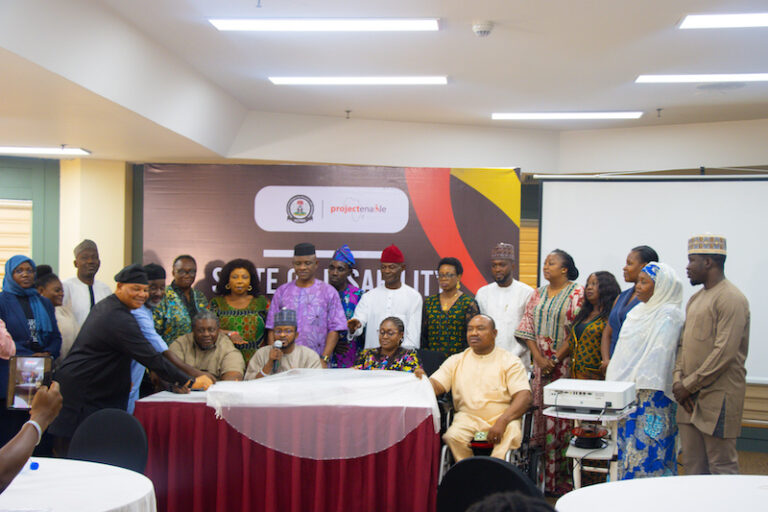By Peter Omopo
Abuja | July 26, 2025
In a major step toward inclusive governance, Project Enable Africa on Friday launched the first-ever State of Disability Inclusion Report (SDIR) 2024 in Abuja, in partnership with the National Commission for Persons with Disabilities and the Federal Ministry of Humanitarian Affairs and Poverty Reduction.
The comprehensive national report evaluates the implementation of disability rights across Nigeria’s 36 states and the Federal Capital Territory, with a focus on five key sectors: education, health, employment, policy, and social protection.
Described as a “wake-up call,” the report identifies critical gaps in accessibility, policy implementation, and service delivery for persons with disabilities (PWDs), while offering data-driven recommendations for accelerating inclusion.
Executive Director of Project Enable Africa, Mr. Olalekan Owonikoko, said the report was informed by extensive consultations and interviews with persons with disabilities across Nigeria. “This report is not just about numbers. It reflects lived experiences and the urgent need for change,” he said.
Representing the Executive Secretary of the National Commission for Persons with Disabilities, Mr. Ayuba Gufwan, the commission’s Director of Legal Services, Mr. Nkem Uchegbulam, noted that enforcement guidelines and compliance certificates have been developed to ensure accessibility standards are met nationwide.
“We are committed to effective enforcement that protects the rights and freedoms of persons with disabilities,” he stated. He added that the commission would issue a memo to federal and state agencies, aligning their mandates with the report’s findings.
Speaking on behalf of Project Enable Africa’s board, Dr. Kola Olugbodi recalled that the National Disability Act, signed in 2019, allowed for a five-year transition period for full compliance. “This report marks the end of that grace period. It tells us where we stand, and where we must go,” he said.
Also addressing participants, Mrs. Maryam Keshinro, Permanent Secretary at the Federal Ministry of Women Affairs, said people with disabilities have been ignored for too long. Represented by Mr. Ayuba Richard, she highlighted the intersectional challenges faced by women and girls with disabilities.
“Too often, their voices, dreams, and struggles are absent from public discourse. This report begins to change that by placing inclusion at the heart of our national agenda,” she said.
Keshinro emphasized the need for gender-sensitive inclusion strategies, asking: “Are public spaces truly accessible? Do schools accommodate children with disabilities? Are our development programmes inclusive by design?”
Delivering an overview of the report, disability rights advocate Mr. Bukola Adebayo revealed that only 23 states have domesticated disability laws as of 2024, with just 15 having operational agencies. He called for urgent resource allocation and nationwide accessibility audits.
He also urged a comprehensive review of national and state health insurance schemes to ensure they meet the unique health needs of persons with disabilities. “Inclusion cannot be one-size-fits-all. Our systems must be tailored to reality,” he said.
Funded by the Nigerian Youth Futures Fund, the SDIR is a flagship product of the Disability Inclusion Metric Project, launched to coincide with the end of the five-year compliance timeline set by the National Disability Act.
Stakeholders at the event, including development partners, civil society, and government representatives, pledged support to ensure the report becomes a tool for reform, not just a policy document.

